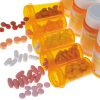- Empty cart.
- Continue Shopping
The Role of Family Members in Medication Safety

Medications are an integral part of healthcare, helping individuals manage various medical conditions and improve their overall well-being. However, the safe and effective use of medications is not solely the responsibility of healthcare professionals. Family members play a crucial role in medication safety, ensuring that their loved ones receive the right medications, at the right dose, and at the right time.
Understanding Medication Safety
Before delving into the role of family members, it’s essential to understand what medication safety entails. Medication safety refers to the practice of using medications in a way that minimizes the risk of harm to the patient while maximizing the therapeutic benefits. Ensuring medication safety involves several key aspects, including:
- Prescription Accuracy: Ensuring that the medication prescribed by the healthcare provider is correct and appropriate for the patient’s condition.
- Dosage Accuracy: Administering the correct dosage as prescribed by the healthcare provider, taking into account factors such as age, weight, and overall health.
- Adherence: Consistently following the prescribed medication regimen, including timing and frequency of doses.
- Monitoring: Observing and reporting any adverse effects or changes in the patient’s condition while on medication.
- Storage: Properly storing medications to maintain their effectiveness and prevent unauthorized access.
The Role of Family Members
Now that we have a clear understanding of medication safety, let’s explore the pivotal role family members can play in ensuring the well-being of their loved ones.
1. Medication Advocates
Family members can act as advocates for their loved ones, especially when the patient is unable to communicate or make informed decisions independently. This advocacy includes:
- Understanding Prescriptions: Caregivers should make an effort to comprehend the medications their loved ones are prescribed, including the purpose of each medication and potential side effects.
- Double-Checking Prescriptions: Before leaving the doctor’s office or pharmacy, family members can double-check that the prescription matches what the healthcare provider discussed.
2. Medication Organization
Proper organization of medications is crucial to avoid confusion and potential errors. Family members can assist by:
- Creating Medication Lists: Maintaining a comprehensive list of all prescribed and over-the-counter medications, including dosages and schedules.
- Using Pill Organizers: Utilizing pill organizers to sort medications by day and time, making it easier for both the patient and the caregiver to track adherence.
3. Medication Administration
Family members may be responsible for administering medications, particularly when the patient cannot do so independently. To ensure safety:
- Follow Dosage Instructions: Administer the correct dose as prescribed by the healthcare provider. Using measuring devices, such as syringes or pill cutters, can help achieve accuracy.
- Adhere to Medication Schedule: Maintain a consistent schedule for medication administration, setting alarms or reminders if necessary.
- Monitor for Adverse Reactions: Be vigilant for any unexpected side effects and report them promptly to the healthcare provider.
4. Communication with Healthcare Providers
Effective communication with healthcare providers is vital for medication safety. Family members can:
- Accompany Patients to Appointments: Attending medical appointments with the patient can help facilitate communication and ensure that questions or concerns are addressed.
- Ask Questions: Don’t hesitate to ask the healthcare provider about any uncertainties regarding the medication regimen or potential interactions with other drugs.
5. Medication Storage and Disposal
Proper storage and disposal of medications are essential to prevent accidents and misuse. Family members should:
- Store Medications Safely: Keep medications out of reach of children and pets, and store them in a cool, dry place as specified on the label.
- Dispose of Unused Medications: Safely dispose of expired or unused medications as recommended by local guidelines, which may include designated medication disposal locations.
6. Supporting Adherence
Adherence to medication regimens is critical for treatment success. Family members can offer support by:
- Encouraging and Reminding: Gently remind the patient to take their medications as prescribed, and provide encouragement and positive reinforcement.
- Understanding Challenges: Recognize that some patients may face challenges in adhering to their medication regimen, such as forgetfulness or difficulty swallowing pills. In such cases, explore alternative solutions with healthcare providers.
Challenges and Considerations
While family members play a crucial role in medication safety, it’s essential to acknowledge the challenges and considerations that come with this responsibility.
1. Complex Medication Regimens
Some patients may have complex medication regimens with multiple medications taken at different times of the day. Keeping track of these regimens can be challenging, but careful organization and communication can help mitigate this issue.
2. Patient Privacy and Autonomy
Respecting the patient’s privacy and autonomy is essential. Family members should strike a balance between providing support and allowing the patient to manage their medications independently when possible.
3. Medication Errors
Despite the best intentions, medication errors can occur. Family members should be prepared to act swiftly in the event of an error, seeking immediate medical attention if necessary.
4. Cultural and Language Barriers
In diverse families, cultural and language barriers can impact medication safety. It’s important to address these barriers and ensure that all family members understand and can participate in medication management.
In Conclusion, Family members are integral partners in ensuring medication safety for their loved ones. By acting as advocates, organizers, administrators, communicators, and supporters, they contribute significantly to the well-being of patients. However, it’s crucial for family members to approach this responsibility with knowledge, organization, and open communication with healthcare providers. Together, healthcare professionals and family members can work as a team to achieve the highest level of medication safety, ultimately improving patient outcomes and quality of life.








